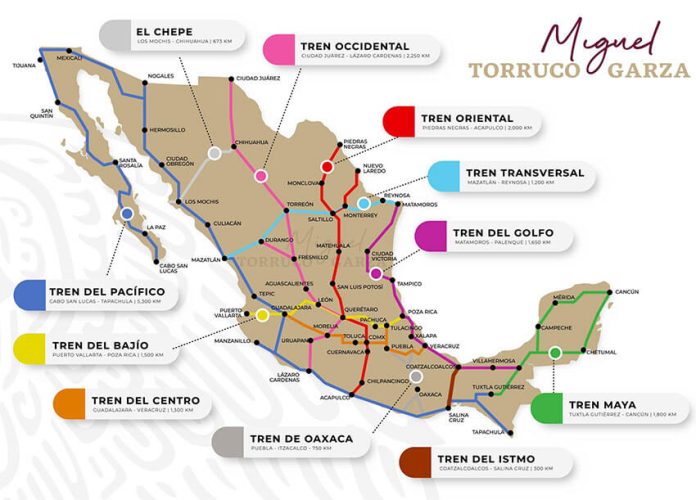There are currently only three passenger train services in Mexico, excluding commuter services such as those that run on the Suburban Train railroad in the greater Mexico City area.
But by 2050 there could be 11 interconnecting services if all the new routes proposed by a ruling party lawmaker are built.
Miguel Torruco Garza, a deputy with the Morena party and son of federal Tourism Minister Miguel Torruco Marqués, published a map to his Twitter account earlier this year that showed existing and possible routes for passenger trains.
“We’re close to making this a reality and returning passenger trains to our Mexico,” Torruco tweeted above his “map of passenger trains in Mexico 2050.”
The lawmaker said Monday that he had presented an initiative in the lower house of Congress that called for the recovery of Mexico’s passenger train system, which fell by the wayside after privatization in the 1990s. He also published a second, slightly different rail map to his Twitter account.

Among the 11 routes on Torruco’s latest map is an existing one and two others that encompass sections of track on which tourist trains currently run.
The three services that currently operate in Mexico are El Chepe, as the Chihuahua-Pacific service between Chihuahua city and Los Mochis, Sinaloa, via the Copper Canyon is known; The Tequila Express, which links Guadalajara to the town of Tequila, Jalisco, the birthplace of Mexico’s most famous tipple; and the Tijuana-Tecate service in Baja California.
According to the map published by Torruco, the Guadalajara-Tequila service would be encompassed within a longer passenger service from Poza Rica on the Gulf coast in Veracruz to Puerto Vallarta on the Pacific coast in Jalisco. The 1,500-kilometer Bajío Train line would run through cities such as Pachuca, Querétaro, León and Guadalajara.
Similarly, the Tijuana-Tecate service would become a small section of the proposed 5,300-kilometer-long Pacific Train line, which would link Cabo San Lucas, Baja California Sur, to Tapachula, Chiapas, via cities including La Paz, Tijuana, Mexicali, Hermosillo, Mazatlán, Tepic, Zihuatanejo, Acapulco and Puerto Escondido.
The other routes featured on Torruco’s map are the Central Train line from Guadalajara to Veracruz city; the Oaxaca Train line from Puebla to the Oaxaca coast via Oaxaca city; the Isthmus (of Tehuantepec) Train line between Coatzacoalcos, Veracruz, and Salina Cruz, Oaxaca; the US $10 billion Maya Train railroad, which is currently under construction and will link cities and towns in five southeastern states; the Gulf Train line from Matamoros, Tamaulipas, to Palenque, Chiapas; the Transversal Train line from Mazatlán, Sinaloa, to Reynosa, Tamaulipas; the Eastern Train line between Piedras Negras, Coahuila, and Acapulco, Guerrero; and the Western Train line between Ciudad Juárez, Chihuahua and Lázaro Cárdenas, Michoacán.
The federal government has outlined plans to run passenger services on sections of the routes proposed by Torruco but not along their entirety.
For example, the Mexico City-Toluca Train line, left incomplete by the previous government, is slated to finally open in 2023, while President López Obrador said earlier this month that 30 billion pesos (almost US $1.5 billion) would be invested in a passenger service between Coatzacoalcos and Palenque via the Dos Bocas refinery, which is currently under construction on the Tabasco coast.
Planning documents obtained by the newspaper El Universal last year indicated that the government was also planning to launch a passenger rail service between Coahuila and Tamaulipas, which would be a branch line of the Eastern railroad proposed by Torruco.
In addition, the government is upgrading existing tracks on the Isthmus of Tehuantepec as part of its trade corridor project, which is touted as a potential rival to the Panama Canal. That railroad could be used by the Isthmus passenger service Torruco advocated.
Another possible project is a high-speed train link between Mexico City and Querétaro city. The previous government suspended the project, but there has been some speculation it could be revived.
With reports from El Heraldo de Chihuahua, Expansión Política and El Financiero
